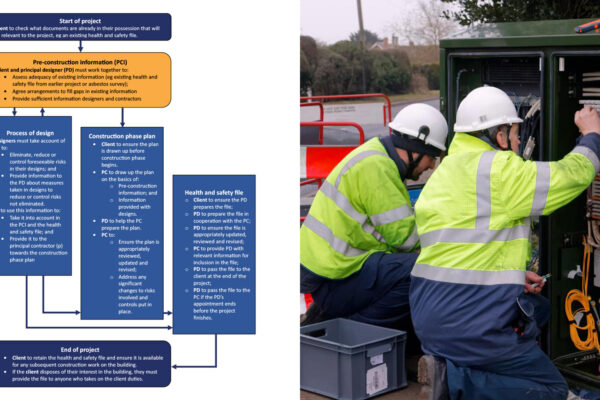Duty of Care Responsibilities
Duty of care is a matter of common law, but what does that really mean? The 1974 Health and Safety at Work Act states that all employers have a duty to do whatever is ‘reasonably practicable’ to protect the health, safety, and wellbeing of their employees. But how can you be sure that you are doing what you need to fulfil your duty of care?
Whether you are running a small start-up or family business, a mid-sized telecoms or professional services company, or a large corporate organization, you have a responsibility to protect the people you work with against physical, mental, emotional, and economic harm. This applies to anyone that comes into contact with your work, from a single employee to large teams and departments, and including both volunteers and contracted workers, clients and members of the public.
Duty of care is very important, but never fear! There are plenty of resources available to help you understand what you can do to protect the health, safety, and wellbeing of the people you work with.
This post will explain what duty of care means to you.
Why do employers have a duty of care?
As an employer, there are all manner of reasons why you should want to look after the health and safety of the people you work with.
For starters, it’s the right thing to do to make an effort to prevent accidents, illness, or other harm in others, and promote a happier and healthier working culture. If you have decision-making or influencing powers, then you also have a moral responsibility to use them well.
Duty of care is also a legal matter that you need to keep on top of. It was created by the courts with the specific purpose of avoiding injury caused by carelessness and neglect, and you could face liability if you neglect your duty. Take a look at how the HSE outlines how civil law applies to health and safety here. Many aspects of duty of care may be a legal obligation to you as an employer, but even when you don’t have to, they count towards best practice and are highly recommended.
You want to invest in a healthy work culture for the sake of your business, too. Being proactive in your duty of care will help people feel valued and cared for, and lead to positive internal relationships in your organization. This will have a knock-on effect on staff engagement and retention, productivity and loyalty. It will be good for your reputation among industry peers, clients, and local authorities, as well!
What counts as duty of care?
Your duty of care means that you will take reasonable steps to ensure safety in your workplace, and prevent any harm, injury or loss coming from activity in your organizational activity. You want to reduce the risk of injury or ill-health, prevent harassment and discrimination and occupational stresses, and help the people you work with feel safe and happy in their jobs.
Duty of care typically covers the following areas:
Buildings and premises
- Providing a safe place to work
- Ensuring the premises are clean and free of risk
- Providing safe routes of entry and exit
- Providing health and safety signage according to health and safety regulations
- Ensuring equipment is installed and used correctly
- Providing appropriate protective equipment.
Risk assessments, information, and training
- Assessing risks and instigating measures to improve health and safety
- Provide information on risks and preventative measures
- Provide instructions on how to minimise risk and comply with safe working systems.
Health and safety policy
- Providing a clear health and safety policy is highly recommended for all employers, and a legal obligation for organizations with five or more employees.
- Outlining a commitment to ensuring health and safety in the workplace
- Outlining health and safety procedures and responsibilities according to best practice
- Outlining a grievance policy.
Insurance
- Covering any personal injury, harm, or loss, and claims from 3rd parties
- Taking out employer’s liability insurance (minimum requirement), and public liability insurance (if necessary).
Hazardous substances
- Being aware of the Control of Substances Hazardous to Health (COSHH)
- Assessing risk to health, and protecting people from exposure to, hazardous substances.
Welfare
- Providing toilets, washing, and changing facilities
- Making sure the workplace has clean air, drinking water, and is a comfortable temperature
- Providing adequate lighting
- Providing sufficient and safe work space
- Making sure the working environment is clean and obstacle free
- Monitoring workload, environment, working patterns
- Including stress and depression in risk assessments.
Fire Safety
- Adhering to fire safety standards.
Registering activities
- Registering existence of company with the HSE or local authority
- Registering dangerous activities, use of premises (with fire authority), and food preparation, storage and sales (with environmental health).
First aid
- Provide at least one first aid box
- Appoint a trained first aider
- Provide a notice telling staff the location of the first aid box, the name of the first aider, and where the first aider can be found.
Think about duty of care as an integral part of your standard business practice, and your health and safety measures will secure a smooth-running, healthy workplace!
How to keep up with your duty of care
Remember that you are not alone! Yes, you have a duty of care, but that doesn’t mean working in isolation. Working with your team is an essential part of effective health and safety. Make sure you understand the relevant policies and legislation, but also how health and safety works in your workplace. Conducting a thorough risk assessment and communicating with the people you work with is a good place to start, as well as looking into training opportunities and finding out what expert advice might be available.
You can build duty of care into the foundations of your organisational culture. Making sure that your workforce feels that you have their best interests at heart will foster a positive relationship of mutual trust that will keep your business strong.
Duty of care is not just your legal duty – it’s common law and common sense. The more care and compassion you show the people you work with, the more healthy, happy, and productive your workplace will be.
Do you want to find out more about what duty of care means to your job? Leave a comment below if you have any questions!



